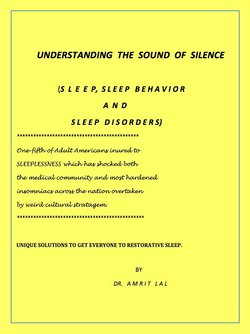Читать книгу Understanding the Language of Silence - Sleep, Sleep Behavior and Sleep Disorders - Dr. Amrit Lal - Страница 24
На сайте Литреса книга снята с продажи.
INCREASE IN LONGIVITY
ОглавлениеAdvances in medical science and public health, better sanitary conditions and progress in different types of immunizations have increased “longevity of life” which manifests in a great surge of geriatric populations everywhere. Worldwide people live longer which accounts for a greater number of health issues typical of old age and with it greater number of sleep disorders such as insomnia, apnea (disoriented sleeping by way of respiratory distress), cardio-vascular diseases, stroke and neurological disorders like dementia, Parkinson Disease, Alzheimer’s Disease and dementia. (Some research, for example, shows that eventually everyone in America will either have Alzheimer’s disease or care for someone who has it). This happens because many older people get less restful sleep than what they need, and because of a number of endogenous causes (for example, poor health and use of medication to treat various health conditions, pain, psychological stress and anxiety) and exogenous causes such as lifestyle, poor sleep hygiene and uncomfortable sleep environment which include noise, light, uncomfortable mattress or a room which is too hot or too cold for a comfortable sleep. Among other exogenous causes including behavioral aspects of sleep such as lack of exercise, sedentary living, excessive indulgence in caffeine, alcohol and nicotine play anti-sleep role. Exogenous causes also include daytime napping which is one of major destroyers of nighttime sleep. Sleep deprivation can also shorten lifespan. This emerges from a large population-based 22-year follow up study reported in the journal Sleep in 2007.
In an earlier large scale study involving 2,889 women also reported in Sleep (2006) found a significant association between sleep behavior and poor daytime performance in a community dwelling of older women. Smokers are more likely than non-smokers to remain awake at night and suffer from daytime sleepiness. Some studies have found that smokers are 4 times as likely as non-smokers to suffer from sleep apnea. Alcohol relaxes and can help initiate sleep, but when its effect wears off it has the opposite effect, causing awakenings and fragmented sleep during remainder period of the night. (Advice: Better don’t take alcohol within 6 hours of bedtime). These causes, both endogenous and exogenous contribute to sleep disorders and their aftermaths, greatly affect the quality of life.
